#the difference in how the creator and the audience perceive a work
Explore tagged Tumblr posts
Note
hi! I love your Midnight Oil fic, it’s so good! I have a question about it-more specifically Baron. In the fic, Baron seems to be based on Fig’s lies instead of Riz’s, but during the baronies/con era, it seemed implied that Riz was at least dreaming of them. Am I wrong, and if not, will the fic ever expand on that?
Hi! Thank you for the question! There are a lot of moving pieces in Midnight Oil and in all honesty, I don't know for certain where they're all going to end up, and I certainly didn't know for sure what the fic would look like up to this point when I started, let alone beyond that. All this to say, when I put that Baron foreshadowing in the Baronies era, I had no idea what I was going to do with them and simply trusted myself to figure something out in the future. Obviously, I did! But unfortunately that foreshadowing does not match what I ended up doing with them. If/when I go back to do any edits, I'll definitely change it.
This strategy of leaving myself threads and trusting that I'll pick the back up has generally worked well in Midnight Oil--I had no idea what I was going to do with Jean when I left him alive, and I didn't decide that Nazca was going to be Poxson's red herring mom until I wrote the last chapter where she's alive--and it maintains my enthusiasm for writing, but there are drawbacks to it.
Baron specifically was a huge question mark for a long time in terms of how I was going to incorporate them, or if I was going to incorporate them at all. There was a version I played around with for a bit where Kalina basically created Baron and thrusted them in Riz's direction after Aelwyn got captured as a replacement for her (predictably, he took it extremely poorly) but that's not what ended up happening. I didn't know Baron was going to be Fig's thing until I wrote the chapter where it's first mentioned.
So that's my answer, but that's very much from a writing perspective. As for an in-universe explanation (and this is largely me talking out of my ass) Baron is already semi-formed at this point in time and wants to play with their cat?/sister?'s toy for a little bit before daddy says he's off limits because Riz is doing important work.
#probably not the most satisfying answer in the world. but it's true.#it's always interesting to me#the difference in how the creator and the audience perceive a work#cause i'm Big Brained especially when it comes to plotting Midnight Oil#but i did not know six months and. like. over 200k words ago that Fig!Baron was going to be a thing#i've conceived of and discarded and written so many different pieces of Midnight Oil#i'm very happy with what's in the fic and i don't think i would go back to add anything#but there's always shit bopping around in my head#for example i think about The Bad Ending. constantly#heist of the crown of the nightmare king with Riz Arianwen Ezri and Natasha.#the car chase part of that scene came before the part where Riz died which came before Landrin Lier#oh god there was a whole subplot where Sklonda sued the EPD and won that i completely cut out because while it was thematic#it was a word count sink. unrealistic and i didn't want to do legal research. The Themes work without it.#it's all in flux. to me.#(it is not in flux and everything that's published is Midnight Oil Canon)#but to me it feels flexible#midnight oil fic#midnight oil fic spoilers
5 notes
·
View notes
Text
Chapter 423 Thoughts: Further Reading
I'm going to try to clear out some inbox/message/AO3 comment backlog in the next week, but in the meantime, having gotten my own post up on the chapter, I also want to share some posts from others that are in a similar vein as my own thoughts, or that I otherwise find worthwhile.
From @codenamesazanka:
Nal has been doing a lot of post-writing and ask-answering since the leaks first dropped, and it’s all on-point, but there are a few posts I want to specifically link to:
Firstly, this post on how the U.A. kids in general and Deku specifically have, despite fans’ expectations, long been underprepared to truly acknowledge and address the structural problems of the system they’re upholding, as well as how Deku bears that out in the Edgy Deku arc.
Secondly, this post is on how the warning signs for this ending have been there all along offers a good concise rundown of some key places where, if Deku had ever cared about Shigaraki Tomura as a person (rather than just the Crying Child as a metaphorical construct), we should have seen him acting differently than he did.
Thirdly and fourthly, these two posts talk about the Japanese BNHA fandom’s response to the chapter. I think it’s interesting and worthwhile to consider the target audience/native culture’s response to a work when possible—there’s a lot you can learn about a story and its author’s intentions by knowing how the story’s audience is receiving it! It can tell you about the audience the story is written for, what the values infusing the story are understood to be, whether those values align with the values of the audience, whether the author is trying to be populist or challenging, and so forth.
The culture gap between Horikoshi and his Western/U.S.ian audience can result in a lot of crossed wires, and checking how the Japanese BNHA fandom is reacting to the story can clarify some of that confusion. It is, of course, up to the individual to decide how much to mitigate one’s own response to the story in light of that culture gap; I don’t think any creator is owed unquestioning carte blanche just because they’re from a culture with different popular values. I certainly wouldn’t want someone in Japan watching, for example, Top Gun: Maverick and concluding that it’s beyond criticism because the fetishization of military hardware is just American culture! Having at least some grasp on the author’s personal context is thus helpful in balancing open-mindedness and critical thinking when analyzing/critiquing a work.
(So, just to be clear, I understand the cultural context of Deku "saving Shigaraki's heart" being considered a worthwhile victory even in the absence of saving his *checks notes* life. I just disagree in the strongest possible terms.)
For good measure, have another post about the disparity between how destructive Deku’s focus on the Crying Child is to any chance Hero Society has to improve in the future.
From @itsnothingofinterest:
This reblog of an older post discussing the increasing power of quirks over the generations and how that problem would logically intersect with the precedents Deku sets here. Bleak stuff!
From @class1akids:
First, this post runs through some of the fans’ desperate attempts to second-guess Shigaraki dying here but explains the various ways each would be in some fashion unsatisfying, because there’s no solution that doesn’t ruin some key aspect of the story.
Second, this very short post raises a very good point—one I hadn’t considered!—about how Shouto may not have talked as much to Dabi as Ochaco did to Toga, but Shouto’s always valued actions over words, and his actions indicate loud and clear how much he wanted to save Dabi. And in ways that thematically tie into his arc about how he perceives and defines his quirk, no less! It’s not about Chapter 423, as such, but it’s a very instructional contrast between Deku and Shouto, the latter of whom was actually trying to both stop and save the Villain he was fighting, the former of whom…was not.
From @linkspooky:
Spooky’s got a pair of posts contrasting BNHA with Yu-Gi-Oh GX, both of which are very long and very worth reading. I don’t know if they were always intended to be companion posts—the first one was posted last month, and the second less than 48 hours after the leaks landed—but they function well in that capacity now.
The Supreme King Judai vs. Dark Deku: How To Do a Dark Deconstruction of your Shonen Hero! is an arc comparison post between the titular arcs and discusses in detail the way GX’s Judai and BNHA’s Deku are put through the paces of a dark hero arc, and why Judai’s works and Deku’s doesn’t. What it boils down is that GX is willing to let Judai make the bad decisions his prior characterization always foreshadowed that he would make, leading him to fail, horribly, in consequential, lasting ways that paint him as being very much in the wrong. BNHA, conversely, has the characterization foreshadowing but is unwilling to the point of open terror of letting Deku fail or be wrong in ways that will actually do lasting damage to him, his friends, or his relationships. This is the same core problem the overarching series faces, and thus, while not about Chapter 423 itself, this piece is an excellent preface for the next one.
Shigaraki Vs. Yubel: How To Save Your Villain deals with the total collapse of BNHA as a story due to the way it fails to recognize Deku killing Shigaraki as a failure of its main character’s personal arc. In comparison to GX’s resolution of Judai and Yubel’s relationship, It describes the story BNHA seemed to be promising us it would tell in its endgame, then discusses how that story is fundamentally broken by its actual depiction of Deku’s actions wrt Shigaraki and the other Villains Deku faces. I particularly enjoy the breakdown of why the language of “forgiveness” thrown around by Deku and Ochaco is so wrong-headed and off-base.
A handful of pithy witticisms and bleak humor:
At least we’ll always have Spinaraki.
Imagine the story we’d have gotten if Deku had walked out into the hallway and thrown it into the nearest trashcan.
This would have been a lot less work than the concert, admit it.
81 notes
·
View notes
Text
I know it's a bitter pill to swallow in this fandom for many reasons but, the phrase "open to interpretation" IS inherently a positive phrase that good creators use to affirm to their audiences that stories and art belong to the fans, and that every fan is able to find their own meaning through their own interpretive lens. It's not up to creators or actors to tell people what something--especially ambiguous or subtextual moments--mean. Everyone will come to a different understanding, some views might be more supported by canon than others, but it's still within every viewer's right to see things how they see them.
All "open to interpretation" means is: you get to interpret it! And you! And you! This is a key tenant of any creative work. It can be interpreted. And that is what literary analysis is all about. You build a case for your interpretation. You go into the text and find supporting evidence for your view, your thesis. And some interpretations are argued better than others. But everyone's still allowed to have their interpretation. (Also, literary analysis is fun).
I say all this because I've seen posts about Jensen going from "open to interpretation" to "clear text" as if he's now against the fact that things can and will be interpreted by fans. In terms of Cas's declaration of love? Yes, that is "clear text." It's romantic in nature, that's not up for debate, and Dean processed and understood it as romantic on the dungeon floor. But for stuff that is still ambiguous, still subtextual in some ways, like Dean's own feelings? Those are still open to interpretation by all sides, whether we like it or not. Until we get to see more of Dean and Cas's story in the basically guaranteed reboot, Jensen is not going to speculate about Dean's feelings or Destiel's reunion. He's never going to word-of-god confirm anything about this on stage at a convention. We have to wait to see it play out on screen.
As an actor, it's also not his place to confirm or deny these things. He leaves it up to the fans to read into his performance whatever they want. And yes, that sentiment IS affirming to a Destiel interpretation. We can read reciprocation into his performance. We can read romantic love into his words about Dean wishing he'd said "I love you back." We can look back on the years of queercoding and subtext and Jacting Joices and read Dean as being in love with Cas for years. And, well, the other side can read what they want into it, and we don't need to care what they think, tbqh.
This, IMO, is also part of the reason Jensen tends to give "vague" answers or use language that can be perceived in different ways by either side. As an actor, at a fan convention where fans of all sides of the fandom have paid to be there to have a good time, it's not his job to personally validate specific headcanons and interpretations. Jensen may have his own personal beliefs about Dean's feelings, but he's not going to divulge them in full if they close off one side's interpretation. So he will weave his way through answers. He will use terms like "brother in arms" which one side will hear as simply "brother" and think "platonic" and Destiel shippers will hear as the full meaning, a strong bond between men, and see the queer history associated with these warrior bonds.
He does this, IMO, to keep all lanes open for every fan, because first and foremost he's an actor at a convention being paid to entertain. He's also not a writer, he's not someone who can definitively say what was intended. Personally, I feel that his metaphor about being in an art gallery that he gave back in 2020 is incredibly apt. People come to the gallery and look at the art and find their own meaning. And the artist isn't standing there beside them confirming or denying their interpretations. That's not the artist's job. Once it's out there, it's for others to find meaning in what the artist made.
And again, it's not his place to speculate or write fanfiction for anyone on stage and personally confirm or deny headcanons. He's pretty adamant about the reboot, so I think for some things we'll just have to wait and see.
#if the man says something is open to interpretation again one day i don't want to see ppl screaming and crying that he's 'walking back'#like no nope! all art is inherently open to interpretation. he's right abt that.#this fandom's personal baggage with that phrase doesn't make it less true#it's a neutral to positive phrase that affirms that fans get to find their own personal meaning in a story or work of art. that's it.#things that have been made textual and defined. such as cas's romantic declaration. those are not up for debate#but other aspects of canon are. whether you like it or not. and personally i love a thesis. i love analysis. so i have fun with it!#vic.txt#fandom vs media literacy#jensen and destiel#long post
64 notes
·
View notes
Text
Another Clue in Viktor's Tarot Card?
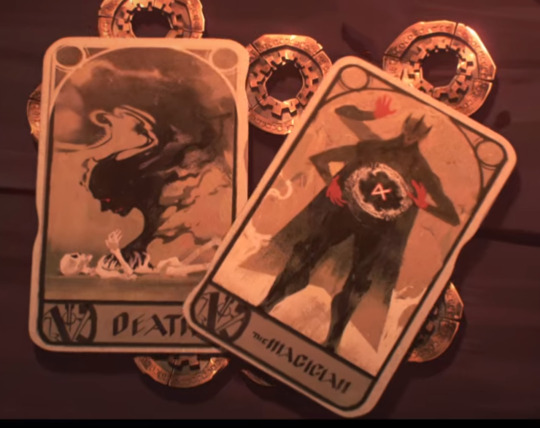
I think I figured something out. In an older post I talked about how Arcane used tarot symbology to possibly hint at future developments for season 2. It was specifically how Viktor and Jinx fit into the role of the Magician and Death tarots respectively and how it works for Sevika. There was one thing that was bugging the hell out of me when i finished it. What was the symbol within the Machine Herald's grasp?
At first I thought it was the mathematical symbol for fish (∝), without the curves, like how Ekko' infinity symbol are sharp triangles instead of round loops. I thought it could mean Viktor needed to recognize the balance and proprtions necessary to unlock the Arcane and be an indirect reference to how similar but different Ekko and Viktor are. But I think the answer might be simpler.
It's an 'X', sideways. Obviously, the 'X' could refer to the x-factor the Magician needs to unlock the Hexcore's power. And that's the fun trick of it because there's only been one person I know in League that's been explicitly associated with this kind of 'X', it's Jinx.
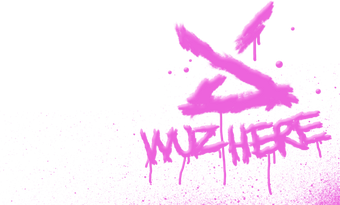
When Jinx's character debuted in League of Legends, instead of releasing a bio first, they had her 'vandalize' Vi's page with graffiti (really fun marketing move). The end of the page had a signature tag that said "X WUZ HERE" because they didn't want to reveal her name so they used this special "X" instead. Later, the tag was just replaced with "JINX WAS HERE.". I thought it was a one-time thing, but no, Jinx's special 'X' still remains in the game to refer to her presence. For example, one of Caitlyn's gag interactions has her shooting her rifle that's been tampered with by Jinx. And when it happens Caitlyn goes, "Ready, aim... (gasps) Urgh! Why am I not surprised?". Who else could it be?
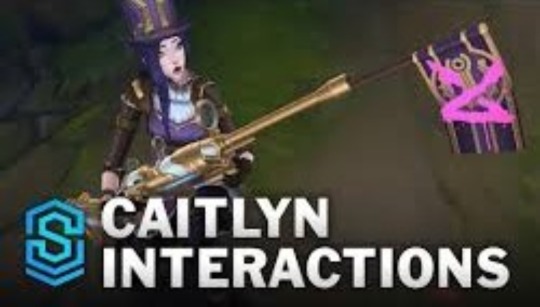
So this symbol is still associated with Jinx, specifically as a substitution for her name, and it's in the Machine Herald's grasp. I don't think this is meant to hint at any future control Viktor would have over Jinx, nor would he want to. It could mean that he will need a partner in Jinx to help him complete the Hexcore once he and Jayce have their falling out and he's cast out from Piltover (some real Silco and Singed vibes honestly). But maybe it's another hint at how similar their actions will be perceived by us, the audience, like they fly under the same banner of void-touched outcasts playing offense and defense against Piltover. And more so that they will have a deeply impact full relationship with one another. Look at Ekko and Vi, they both bare her tag and you can't pretend she hasn't left her mark on them and their motivations. It's just odd that for Viktor, her tag is in a different position. Maybe it's a past, present, future thing.
I wouldn't bring this up if the creators of Arcane hadn't said that there were plenty of hints at season 2 that the audience hasn't picked up yet, so maybe this is another one. Also, I have noticed that Jinx sometimes has Ekko's infinity symbol on her marketing but it's still solidly an Ekko thing. Even when she has it on her Flame Chomper grenades it's used explicitly to frame Ekko and the Firelights for her damage because it's so well associated with him.
Update: I don't know why I'm just remembering this, but Jinx is also just wearing a big X on her shirt. In fact she's covered in X's, her shirt, her necklacklace choker thing, her shoelaces, her belt, her bandage, the back of her shoe they all have X's in her design.
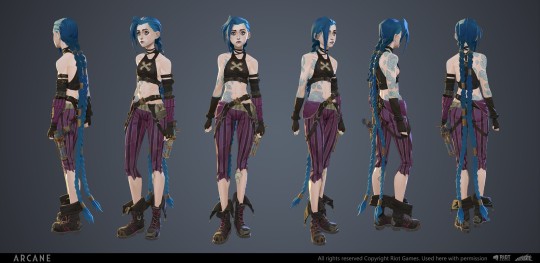
Update 2: I found more X's! They're all over her background in the 'Enemy' music video. The art really isn't being subtle when you notice.
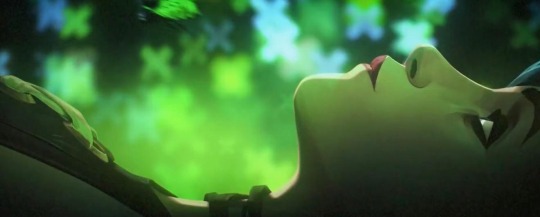
Update 3: Pretty sure this is the last one... maybe. After rewatching I noticed Vi's prison uniform actually has the symbol as a part of her ID number. Altogether her ID would be X516. Though whenever Vi was referred to as prisoner 516. Alone it actually says her name in Roman numerals, 5=V, 1=I, and 6=VI (a but redundant). If we treat it the 'X' as Jinx's name it makes Jinx and Vi before Vi even knows Powder has grown into Jinx, already intertwining their identities.
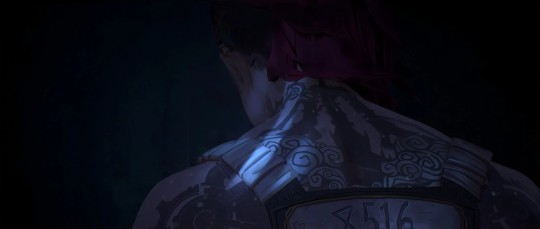
Update 4: I really thought I was done, but I wasn't. I found that both of Ekko's loc rings (which look similar to the bullet shells Jinx uses in her braids) have partial infinities that look similar to her symbol. Ekko specifically is represented with a complete hourglass, and this is literally the one exception. The fact that this symbol is visible when he talks about Zaun and Silco makes me feel ridiculous. If this is a subtle hint at the way Jinx affects Ekko... wow. Jinx isn't even dead, but she's practically haunting all these characters.
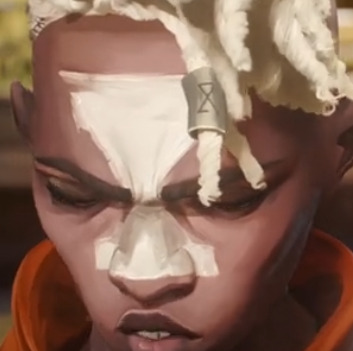
Seriously, it's a purposeful choice to do this, his game icon has full hour glasses. But in Arcane they're not, they're drawn to be similar to Jinx's symbol. Just like with Viktor and Vi, it means internally, not even consciously, he's seeking her out for her.
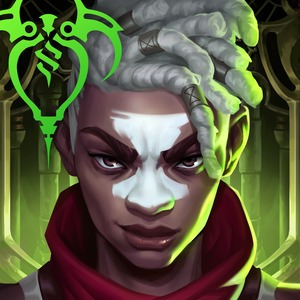
#viktor arcane#the machine herald#machine herald#jinx arcane#arcane#arcane season 2 speculation#it sometimes feels like any mystery can use jinx to solve it#she's a wild card#a loose cannon#jinx is the random ingredient that falls into the cooking pot and when you taste it you’ve invented a whole new dish#it feels so on purpose that almost every league medium keeps viktor and jinx's interactions from minimal to nonexistent#they'd cause too much of an uproar#legends of runeterra technically doesn’t count#vi arcane#ekko arcane#ekko#arcane speculation#arcane meta#arcane season 2#jinx and viktor
230 notes
·
View notes
Text
i think some people need a reminder that no matter what at the end of the day wednesday the netflix show and all the other iterations of the addams family are works of fiction
these characters are not real people
what one fan decides as true for a character does not mean others have to agree with it and it also doesn’t give someone the right away to argue or belittle that person for their headcanons/opinions
ofc the addams family franchise is a work of art that has been passed on to different directors, actors, producers, etc. over the years and each iteration deserves the same amount of respect as any other piece of artistic media out there HOWEVER just because it’s a piece of art that should respected doesn’t mean that people who view/engage with it won’t come to their own conclusions about said art
art is created by an artist and is recreated each time an audience interacts with said art
it doesn’t matter what form of art you make or what platform you choose to present it on once someone besides yourself sees something that you created they will come to a different conclusion than you did
this is not because the creator made a mistake or they didn’t create good enough art to convey their conclusion it’s bc everyone has their own experience that influences their thoughts, feelings, and actions
ultimately your own experiences of the world and your own biases will influence how you perceive a piece of art; including tv
for most people wenclair is just a ship that queer people want to see represented and would makes sense for the characters
and for most wenclair is NOT a way for queer people to try and “turn everything gay” or to ignore, disrespect, and disregard the plot of the show
wednesday being neurodivergent is a headcanon that fans have bc they relate to the character and want representation
wednesday being neurodivergent is NOT a way for people to make the show “woke”
the novelization was a good show to book adaptation
was it the wednesday script word for word??
no because that’s not what it’s supposed to be
was it scene for scene what happened in the show?
no it wasn’t because again that’s not what it needed to be
this book was an insight into wednesday addams’s mind throughout the first season
unfortunately it was not written by tim burton the director or jenna ortega the actor that plays wednesday but instead a third party that has no say in what ends up in the show for future seasons
this does not mean that the author did a poor job the author obviously did their research and has a deep understanding of the character wednesday addams (if they didn’t netflix wouldn’t have hired them) they gave us an opportunity to better understand the character we see on screen when we can normally only understand half of what she is thinking
tehlor kay mejia worked not only with show writers on this book but was hired and approved by netflix themselves to create this book they may have not gotten insight from the director himself but they did have help from people that helped create the show
also a small reminder wednesday does experience emotions!! she just doesn’t display them the way most people do!!
everyone has opinions about everything so if you don’t agree with what i’ve said that’s fine! just please remember that you are discussing a tv show and book with random people on the internet this is not something you need to stress over/fight about!!
also also saying that the author of the novelization only made the wenclair moments happen bc they themselves are queer is a microaggression and very disrespectful!!

and no matter what side of the discussion you are on wednesday addams would be absolutely repulsed at the idea of random people on the internet arguing over her personal life 🖤🕸️
#wednesday#addams family#wednsday addams#wednesday novel#novelization#wenclair#wednesday x enid#jenna ortega#tim burton#wednesday netflix#netflix#book#tv shows#the addams family
36 notes
·
View notes
Note
I’m sorry if you’ve received an ask like this before but I genuinely don’t understand the hand wringing over the rape? People complain about it so much while totally ignoring the fact that torture, murder and war is 5x more prevalent in Berserk which has just become so normalized nowadays people don't even notice it anymore. I obviously don't enjoy the rape scenes, but I really don't think they even stand out the much amidst all the other insane shit going on in Berserk.
To be fair I think rape is different than most fictional violence in part because rape is something that like 1 in 6 women have personally experienced, and even more have experienced some form of sexual assault, and of those who haven't most see it as a tangible fear they have to worry about, unlike torture or dying in battle, and in part because culturally it's very gendered violence (and the fact that men can be rape victims too doesn't negate that) and therefore the way it's depicted says something about how a creator views women/gendered violence.
These are good reasons for creators to be a little bit more cautious and considerate when choosing to portray rape as opposed to most other types of violence in fiction. The emotional impact on a potential reader is likely to be different, and being aware of the emotional impact of your story is part of what makes it effective.
That said, I don't think it's automatically always terrible to portray rape in ways other than serious realistic drama. There's a place for eg eroticized rape. I don't think Berserk is that place though. Personally my biggest problem with the rape in Berserk - not all of the rape, but definitely most - is that it clashes tonally with the rest. Eg, we're meant to see the Eclipse rape as a dramatic tragic moment, but it visually looks like cuckold porn. That's a big tone problem.
But it's also misogynist. If a creator doesn't notice that a sexy rape scene clashes with the intended realistic dramatic impact, then they're basically blind to the objectification of women. The eroticization just comes naturally because they're steeped in it, like they can't perceive of a way to draw a naked woman that doesn't look traced from porn. That's a big social problem.
I don't think all the rape in Berserk is badly written and depicted - the three main characters' backstories eg are all generally pretty well done (give or take the racism in Guts') - but more often than not it clashes with the tone of the rest of the story, especially for readers who have that more visceral reaction to rape. When a story treats it as minor shock value, equivalent to a background character getting stabbed to show that the world is violent, that might work for some people who are more emotionally distanced from the reality of sexual violence, but someone who's been a victim of sexual violence, or knows a victim (which accounts for a large percentage of any audience) is less likely to have the intended mild reaction.
And when a story treats it as emotionally intense drama but depicts it as sexualized, that's also a tone problem and inherently misogynist.
So yeah, that's my take on why people get upset at the rape moreso than the torture and other violence. Sexual violence has a different and more intense place in most people's minds, for good reason.
26 notes
·
View notes
Text
The Decay of Complex Characters and Character Development in Helluva Boss (Stolas and Octavia’s Relationship: Part 1 of 2)
Part 2 here
I’ve seen this in a few different places, but it’s been on my mind in particular since the animated “Look My Way” music video that dropped a while back.
The way the song was updated for the animated music video made the changes to Stolas’ character stick out even more to me, and I really want to talk about what I perceive as some really flawed writing decisions around Stolas’ character.
If you’re a fan of HB please know that I’m not trying to attack the creators or change whatever opinions or feelings you have about the story. If you love this show and this character and they mean a lot to you that’s great! My goal is never to spread negativity or toxicity—it’s always to talk openly about media and how we interact with it. ☺️
I want to start by saying I was a big fan of Helluva Boss, and of Stolas, up until the second season started. And before the second season, my favorite episode by far was “Loo-loo Land”.
(TLDR at the end of the post if you don’t have time to read thru!)
I still really like the episode now, and I especially love the opening scene and song. It’s beautiful, and the song “You Will be Okay” has brought me to tears more than once. It’s one of the best songs in the entire series, and I think the only one that tops it for me is probably “The House of Asmodeus”.
The whole sequence of “You Will be Okay” is both heartening and heartbreaking—it captures the unconditional love and protection a parent promises to give their child, while also expressing the sad truth about that promise that only a parent can know—that you can’t and won’t always be around for your child.
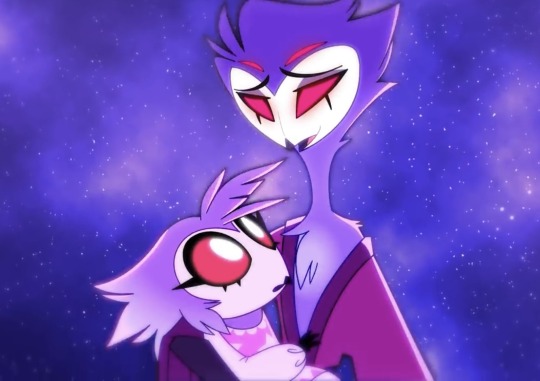
No matter how much you want to protect them from the dangers of the world, you can’t—parents have to let their kids go out into the world and become their own person—the most a parent can do is try to always be there in any way they can for their kids, even if they can’t be there physically.
The lyrics and tone of the song tell us as much. It’s very clear that Stolas is acutely aware that something may happen to him and that he needs to let Octavia know that while he may not be there with her physically, his love for her will always be with her, protecting her.
The build up to the song’s crescendo matching the visuals around Stolas and Octavia bring everything in the scene together really well, and Bryce’s performance is so good that it made me believe for a second that he would keep his promise to Octavia. That he would never abandon her, and would always put her needs as his child first.
That, somehow, he will truly be with her always protecting her, and that she really will be okay.
For a moment it was possible for me to forget the dramatic irony of the situation. That this was the past, that I already knew for a fact that Stolas would cheat on Stella and jeopardize his family life.
The song comes to a close, and through all the seemingly random chaos happening in space around them, Stolas keeps Octavia safe, and lulls her back to sleep. They return to her room, and the scene ends on Via in bed sleeping peacefully.
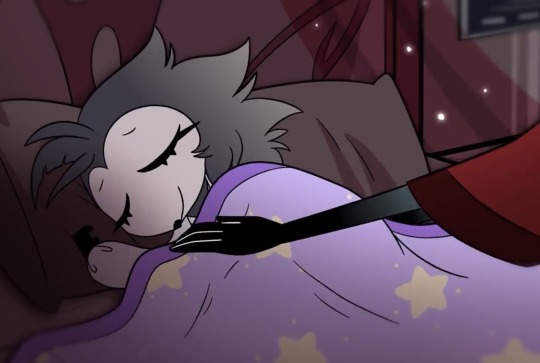
The whole sequence does such a fantastic job of showing you what Stolas’ and Octavia’s relationship was like when she was a child. She trusts him implicitly, and, at least at this time in her life, he seems to have been a present and loving father.
What makes this scene work even better though, is the transition to the present that follows RIGHT after it.
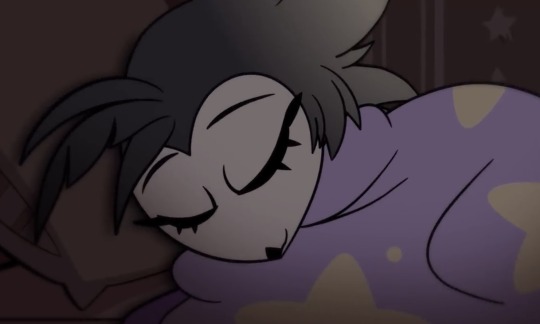
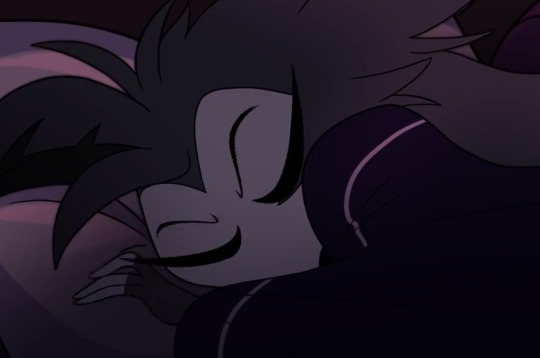


At the end of the song we get this jarring and sharp match-cut of a teenage Octavia being jolted awake by the shrill screaming and fighting of her parents in the background. In that instant, we as the audience see her going from feeling safe and having a seemingly idyllic childhood, to being a moody and neglected teen with a turbulent and unstable family life.
The music change that accompanies this not only fits the change in mood perfectly, but it quite literally tells us what she is feeling—her whole world is crashing down around her.
To this day, I think this transition is wonderful.
The visuals do such an amazing job conveying the changes that have happened in the Goetia family through Octavia’s perspective. And it’s extremely important because it immediately shows the audience that Stolas broke his promise.
I watched this episode when it came out, and when the only other Helluva Boss story and world-building we had was the Pilot and S1E1-“Murder Family”. While it could be assumed that Stella would not be happy about her husband’s cheating, we didn’t know anything about her personality and how she would react.
So. while it was clear that Stella wasn’t acting appropriately or maturely in the next scene, it was also VERY clear that Stolas was at fault for breaking up their relationship by cheating.
I will be talking about Stella’s character in “The Circus”, and how she is used as tool to absolve Stolas of any wrongdoing in season 2 later. For now, I want to stress that I will NOT be talking about future development of her character here.
After Stella leaves Stolas tries to connect with Octavia like they used to and just continuously fails. It’s clear that she’s still very angry with him for cheating on her Mom, and that his trying to carry on like nothing is wrong is irritating her.
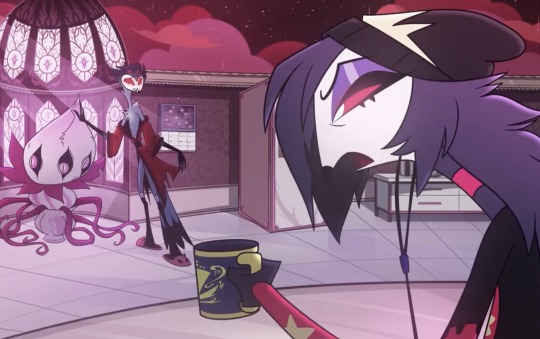
Stolas asks her if she slept well and all she can sarcastically say is “Is that a serious question?”
What Stolas does next to try and reconnect with Octavia is very very important because it shows that he’s still being extremely selfish.
He decides they’re going to LooLoo Land, in a poor attempt to recapture some of their old good memories together and does not once LISTEN to Octavia and what she actually wants to do.
They go, but he uses the trip as an excuse to meet up with Blitzø, and behaves inappropriately and flirts with him the whole time, right in front of Octavia.
This, rightly, is extremely upsetting to her, and she runs away. Stolas follows after her and they have a heart to heart where he FINALLY FINALLY takes the time to listen to some of her concerns and why she is upset.


The episode ends on a happy note-with Stolas asking Octavia what SHE wants to do and what her interests are, and Octavia admitting to Stolas that, “You’re okay sometimes”.
This episode is extremely important to Stolas’ character because it does such a good job of getting across to the audience that Stolas is not a perfect person. That he’s someone who has people he genuinely cares about and loves, but that he can still royally fuck up. He’s sleazy, he doesn’t respect Blitzø’s boundaries, he neglects his daughter, and he doesn’t listen to her, putting his own desires and needs ahead of hers.
And the resolution to this episode is important, not because it fixes everything, but because it is the first STEP in the right direction for Stolas becoming better and becoming the father his daughter needs him to be again.
This episode ends with Stolas meeting the BARE MINIMUM to START making amends with Octavia. He doesn’t even say sorry, just that he would never leave her to run off with Blitzø. There is still a lot that Stolas needs to do to make amends with her, and to repair the ruptures in their relationship.
Due to this, at the time this episode came out, I thought that this was just the very beginning of Stolas’ first character arc—realizing his actions could truly HURT those he cared about, and having to come to terms with the fact that he was in the wrong. That something he did, hurt those around him, and that he would need to take responsibility for that.
“Loo-loo Land” went to such great lengths to show us that Stolas is imperfect. That he is someone who is capable of mistakes and doing the wrong thing, of being oblivious and selfish, and of needing to do better.
And before “The Circus” and “Seeing Stars”, I believed that the writers could develop his character to grow and change and become a better person for his loved ones.
This doesn’t happen however, as again the writers bend over backwards to make sure that Stolas never has to actually directly answer for his mistakes. So much so that they literally don’t let him say “Sorry” to Octavia the next time he breaks a promise to her and doesn’t consider her needs before his own.
After S2E2 of Helluva Boss, “Seeing Stars”, came out, I officially lost any faith in the writers to have Stolas ACTUALLY take ownership and responsibility for the ways he harms those he loves. That first step he took on the path to healing his relationship with Octavia from “Loo Loo Land” has been totally erased, and I can’t imagine whatever resolution they come up with for his character will be satisfying.
I have no doubt that Stolas will receive a happy ending, but I predict it will be one with 0 stakes, and 0 satisfaction, because it will not have been earned. I worry that with any character flaw or upset he causes, another character will be swept under the rug in order to make Stolas appear as if he was always in the right.
As I’ve said before, if that’s the story the writers want to tell, that’s fine. It’s their story, not mine.
I just personally cannot imagine not wanting to explore those character faults and acknowledge them. Maybe, hopefully, I’ll be pleasantly surprised. I’d really like that.
I’ll be following up to this post with a critique specifically of how “Seeing Stars” is very much a retread of “Loo Loo Land”, but in all the worst ways possible.
TLDR;
-In my opinion, the initial handling of Stolas as a flawed and complex character who could make mistakes and be in the wrong was really well done.
-The first canon episode that gives Stolas focus, “Loo Loo Land”, goes to great lengths to show us the ways in which Stolas has failed Octavia.
-This was a great set-up for character development and for Stolas to have to come to terms with his actions and change, but future episodes do not follow through on this set up.
-Will be talking about the episodes that undo the set ups for Stolas’ character development in Part 2.
EDIT:
I made the mistake of missing a part of “Loo Loo Land” where Stolas DOES apologize to Octavia properly—missing this was my mistake—I made an addendum post here that goes over this briefly—Apologies.
#helluva boss critical#helluva boss critique#helluva boss criticism#stolas critical#? I guess? not really? more just examining what I interpret as poor writing choices with his character#media critique#media criticism#long post#HB critique#I don’t know if I want to tag as critical cause I’ve seen some people dunking on the creators#and I just don’t feel comfortable with talking that way about people I really don’t know#I’ve gleaned from some other critique accounts that there is a good deal of drama within the fandom and surrounding the creator#but again I don’t know the creator personally and I also don’t think it’s very fair to chalk every single decision made in a collaborative#to a single person#part 1 of 2#octavia goetia#poor Octavia
45 notes
·
View notes
Note
Hello! My name is Grim, and I fancy myself a bit of a researcher. Now, this is not for anything important or extremely serious. Instead, this is mostly for my own pure enjoyment and something I have in the works that is to be posted on Tumblr. You are not obligated to answer any or all of these questions I have posed. I know it’s a bit much. Take your time, but don’t feel obligated to do anything. Feel free to add any additional input! Thanks for your consideration!
1. How different do you think your work would be, in terms of getting across a point, in a different medium thats not Audio RP?
2. How do you think your work would be different if it more reflected main stream industry forms of storytelling where you as a creator would be more separate? (ex. movies, tv shows, games, etc.)
3. How important do you find the voice acting in your work?
4. You are the primary voice of your works. Would you consider taking a step back from voice acting in your work to focus on narrative work?
5. Do you believe your own individual ability to voice characters enhances the story overall?
6. Do you enjoy the idea of a “Listener character” or would you better prefer to not have one?
7. As a writer, how does the writing of the Listener take you out of your comfort zone? (ie their effect in relationships, plot movements, etc.)
8. Is Audio RP your favored form of art?
9. How do you believe Audio RP differs from main stream forms of art/entertainment?
10. Do you believe that your work has over arching themes that relate to you personally? (very optional)
Hello, and thank you for the questions!
How different do you think your work would be, in terms of getting across a point, in a different medium that's not Audio RP?
If I were to create similar storylines in another medium, I think my work would be very different. The major element that all my stories are based around is the Listener. Everything is crafted from their perspective, so I need to always keep this in mind when scripting and editing. The best ways to handle the narrative and dialogue are through implications with other characters and SFX; to keep audios sounding as authentic as possible, this must always be considered when I work. Much of it is filled with the Listener's imagination, but to convey a point with only audio cues can be a difficult task.
2. How do you think your work would be different if it more reflected main stream industry forms of storytelling where you as a creator would be more separate? (ex. movies, tv shows, games, etc.)
I'd allow the story to breathe and marinate due to the platform it's on and the medium the story is told in.
The genre of audio RP, especially on YouTube is already limited because creators are told that in order to keep an audience, we must hook them within the first 10-30 seconds. Due to this, we develop our audios with that in mind; it can come as a detriment to our creativity and desire to show a story in a particular way. We're confined by parameters that value immediate views and responses in order for our creations to be deemed successful, and when many use YouTube as their primary source of income, this manner of thinking can become the norm. In order to stay relevant, we must research what's trendy, what tropes are no longer popular, and though it's not necessary, online demand can change on a dime. Exploring different topics and themes are also limited due to this; creators must work within the platform's restrictions, and that has impeded many stories with how deep I can dive and what it could've become.
As a visual medium—particularly movies and TV shows—my stories would be far better. Viewers can perceive them the way I want them to and with far more understanding. Although SFX and a wonderful soundscape can teleport consumers to another place, the nuances that I love and appreciate slip through the cracks. On a larger scale, visualising the settings, fashions, and people can elevate a story as it gives a plainer context everyone can draw from. On a smaller scale, facial expressions and body language are paramount for communication, something that audio RP cannot do.
An example of this would be my newest series, The Noble Trials. It's a high fantasy world which, in itself, is difficult to show because in that kind of setting, anything goes. I want the audience to experience the extravagant events, the opulent locations, the embellished fashion. Of course, as I depend heavily on sound design, I have faith in the listeners to imagine that for themselves, but they'll never imagine it the way I do. The only option is to write it through dialogue, and sometimes, this can feel unnatural. I'm one to sprinkle in details, so if I decide to create a new fantasy creature, I must show it through SFX and characters describing it. That's not to say it can't be done, but that requires more time and effort; it depends on if a creator is willing to go the extra mile for a little more immersion.
3. How important do you find the voice acting in your work?
I find it extremely important! If I want my audience to be transported, then all elements of the story must be convincing, and the character I voice is no exception. Voice acting is the primary driver of it all; though dialogue can certainly tell the audience something, the way it's expressed is vital to adding a layer of realism. As I can't rely on faces and movement to show a particular feeling, it must be emoted through speech, and that can elevate a story to the next level.
4. You are the primary voice of your works. Would you consider taking a step back from voice acting in your work to focus on narrative work?
I've thought about it but I don't believe it to be a possibility. Most of my community listen to my works because I'm voicing the characters, so it's something I must continue doing. However, writing is my strength and passion. It gives me true joy, so if I was guaranteed my career would be retained and someone else voiced the main character, I would consider it. At this point however, it's not an option.
5. Do you believe your own individual ability to voice characters enhances the story overall?
Though I'd say I'm okay at what I do in terms of voice acting, I know there are others that are far better than I am, and I believe they could take my stories much further. My projects are made with audio dramas in mind, so I think that someone more skilled in voice acting could easily transform a character of mine.
Also, my vocal range is pretty good, but voicing all characters (I've created 18 so far with many more to come) is very difficult. Although the audience know it's one man behind all these characters, as a creator I'm compelled to separate everyone so they don't sound similar. Of course, it's impossible to take note of every modulation the voice makes and consistently use certain intonations where necessary, but there will always be similarities between the characters which, to me, hurts the story if the voice is comparable to another and the audience notice. It makes me want to develop my acting more, but it's quite saddening despite what I must do to make characters sound different (pitch, accent, tone, etc). In this case, I am my own limitation.
6. Do you enjoy the idea of a “Listener character” or would you better prefer to not have one?
The short answer is no, I do not enjoy the idea of a Listener character. As a writer, it limits what a story can convey.
In the beginning, it was a great challenge because I could experiment with how to tell stories through the perspective of someone who doesn't talk. It allowed me to develop different means of showing a narrative through SFX and one-sided dialogue, and to understand the limitations and liberties I could make. However, there's a massive downside: everyone is different. Some creators like the Listener being a blank slate for the audience to fill, and that's absolutely fine; I started out like this too!
But as I sank deeper into adding dimension and story to my characters, I realised that I needed to do the same for the Listeners. They need personality, and desires, and struggles that will inevitably clash with other characters. A blank slate cannot drive a story, nor can they transform it in any way because there's nothing to challenge or change. For my stories, the Listener's personality and interests must have something of substance in order to interact with characters.
However, this also proves to be inconvenient because the audience may not be able to relate. Some listeners like to insert themselves into an audio while others enjoy it from a third-person perspective. Those who listen in the former way can have difficulties with what the Listeners do because it's a stark contrast to who they are, and that can break immersion. Additionally, they can develop characteristics about the Listener depending on their own beliefs of them—by their own reflection or other means.
The most recent example would be Alex's series. Tl;dr of the story: Alex and Gremlin (the Listener's petname) have been together for four years. One day, Gremlin accused Alex of cheating, they were wrong, tensions arose, both were stupid, they broke up, and Gremlin left to who knows where. The latest episode is a dream sequence that explores Gremlin's thoughts about what happened, what they think of themselves, and it reveals other questionable things they've done. As a character, Gremlin suffers from trauma, and this drives them to act in unfavourable ways similarly to Alex. The purpose of this audio was to show that Gremlin is not as good as they seem. Everyone is flawed, and I make sure my characters are no different. But many listeners likely can't imagine themselves screaming accusations at their long-time partner, stalking them, and living with crippling trust issues and anxiety; therefore, in their mind, that doesn't happen in the audio.
If the Listener character was voiced, I think their views would be different, but this is the main factor: No matter how detailed I am, the audience will never see the Listener the way I do. And as I want to write narratives in a specific way to convey a specific idea, that can get lost in translation. That means a Listener character must be predetermined in order to write a compelling story and explore themes and situations I can't do with a blank slate.
7. As a writer, how does the writing of the Listener take you out of your comfort zone? (ie their effect in relationships, plot movements, etc.)
Having been doing this for a few years, I think I have a comfortable grasp on how to write Listener characters. The main challenge is natural dialogue between them and other characters, as well as staying true to the personality I've given them. Different Listener characters would notice or mention certain things depending on who they are, and I must always keep that in mind. But for the most part, it's pretty enjoyable!
8. Is Audio RP your favored form of art?
Absolutely not. My favoured form of art has always been audio-visual in nature because that's what I respond best to. Films and TV shows are where my heart truly lies, but expressing myself through this medium is a privilege I cannot take for granted. It can evoke just as much emotion as other arts, and I find that amazing. Although I love watching things, storytelling keeps me sane, and I always have something to share or create. Audio RP gives me the opportunity to challenge my ideas, expand my knowledge, experiment with characters, and develop other skills such as audio engineering (which I love). But most of all, it lets me offer my stories to the world, and I'm so happy I'm able to do so.
9. How do you believe Audio RP differs from main stream forms of art/entertainment?
It's an interesting art form in its own right because although there are certain elements of story set in stone, for the most part it's personalised. Drawing from the way I create audios, the audience—even if they aren't projecting themselves onto them—is experiencing a story through the Listener. It's a limited perspective, and the only things that belong to the consumer are their thoughts, though it might not necessarily be canon to the plot. Most narratives are told through a camera, and what the viewer sees is carefully crafted for the purpose of the story. However, as Audio RP is told from a second-person POV, curating an experience is far more immersive, and I think there is still room to innovate with this medium!
10. Do you believe that your work has over arching themes that relate to you personally?
Without a doubt! Many characters share parts of me, whether that be likes, dislikes, ideologies, experiences, or even direct memories. It's easy to use yourself or people you know as a basis for characters, then build upon that to make them their own individual with their own journey.
Niall is the best example of this. At school, he was closeted but was outed against his will and bullied for being gay, and his crush (the Listener) at the time stood by and watched it happen. In the present timeline, Niall is a creative with a job that keeps him occupied, but those traumas shaped him into who he is: a socially awkward and wary man without love for the part of him he refuses to show. His fears of trust and making friends governed him, but above it all, he was afraid to accept who he is. His story explores that deep fracture: navigating what it means to forgive, changing a once rigid and cold outlook on the world, and in the end, permitting a chance for healing and closure, and realising that living without love is no way to live.
Though I didn't experience most of what he did, writing Niall was a way for me to also have hope in similar thoughts that I carry. It was somewhat therapeutic—more-so knowing that his story resonated with other people and helped them find some form of catharsis.
Thank you so much for these questions! I'm so sorry I wrote so much omg
41 notes
·
View notes
Text
I’m frothing foaming at the mouth not normal about the themes of an artist being boiled down into an unrecognizable mess of what other people perceive them as based on what they release publicly, how the image an audience may have of a creator can be completely different than the actual person, and how the only way for someone to be remembered in their fullest being releasing more and more personal information to the public so it can be archived within En Abime.
-William is only the songs that were recorded of him, an artist with no record of their personal life, just their work.
-Thomas is a person who had his life torn to bits by different students, academics, audience members, and it’s been so diluted over time that who he was is a complete mess.
-Tati is someone who curated their life publicly in a certain way to be seen as more confident than she was in life, a fake version of the girl behind the account.
-Mal wasn’t even fully in the Abime until her zines, historically very personal and political works, were archived by libraries. She wasn’t a full person in the eyes of an outsider until her life’s work was put on full display in a library archive.
-Henry is a reflection on the idea that mental illness creates greatness in artists, when really all it does is hurt them, and makes them producing their own work more difficult.
-No idea what’s going on with Claire and Zeke tbh lol
14 notes
·
View notes
Note
Shan! One of the things that I’ve loved learning during my Old GMMTV Challenge project is discovering filmmakers and watching through their project lists. Do you follow specific directors or screenwriters for Asian dramas? If so, who are they, and why? And which dramas of their do you recommend?
A fun one, and an area where I know we actually differ in our approach. In short, my answer to your first question is yes, but also no. :)
By which I mean, I generally do pay attention to who creates the shows I watch, because when I am impressed or infuriated by a drama I like to know who is behind it so I can look into their other work, either to pursue or avoid it. Sometimes I have to go looking for that information, but there are some creators who have such an obvious style that it sets them apart and makes it near impossible to miss the connections between their shows (Kim Eun Sook in kdrama, Aof Noppharnach and Jojo Tichakorn in tbl, Hwang Da Seul in kbl, Lin Pei Yu in twbl, etc). With those I might start something unknowingly and then be like wait a minute is this X’s work? I do maintain awareness and keep creators’ other works in mind when I watch something new because it's fun to look for themes across a body of work, and frankly, to know where the pitfalls are likely to come in.
That said, I do not feel any need to be a completist about any one auteur's resume, I don’t intentionally sit down to watch a creator's work in an organized way, and I actually prefer not to know that much about their personal lives, because I like to focus on the fictional stories without too much real world gunk getting in the way and clouding my reads. I am a "let the art speak for itself" girlie; I'm less interested in authorial intent than in allowing stories breathing room to be interpreted by the audience. I do believe in the Death of the Author school of thought and I don't think it's great when creators try to do too much to control how their work is perceived. One of my current beefs with the Only Friends watch experience is that there is so much real world gunk (branded pairs, shipping and actor stanning, creators posting on social media with context that is not included in the actual canon) getting in the way and messing with interpretations of the show.
Once you get into a fandom at all you will inevitably be exposed to a ton of this kind of thing whether you like it or not. And it comes up a lot in bl because so many shows are adapted from pre-existing source material and rely on known actor pairs, which inevitably affects discourse because people come to these shows with a lot of baggage even before they begin. But I am always interested in story first. I dove into I Feel You Linger in the Air and Absolute Zero with zero hesitation because timey wimey soulmate shit is my jam, not because these shows were made by Tee Bundit and New Siwaj (in fact that would be more of a deterrent than anything if I let it dictate my viewing choices).
So while I am interested in the undercurrent of melancholy across Aof's works, and Jojo's devotion to messy ensemble pieces where everyone is a little bit of an asshole, and Kim Eun Sook's uncanny ability to tap into the zeitgeist and create banger after banger across a range of genres, I don't need to know too much about why their areas of focus are important to them or how it relates to their personal experiences. I prefer not to use fiction as a means to psychoanalyze the real people who create it; instead I just try to engage with and appreciate their art as art and afford them respect as creative geniuses without making assumptions about how each work is meant to reflect their real experiences. Understanding some basic demographics about creators (as in, do they have the appropriate lived experiences to be telling the stories they choose) is about as far as my curiosity goes.
Question 1 TL;DR: I do like to pay attention to who creates the shows I watch so that I can follow the themes in their work, but I am not interested in following the creators themselves closely.
Question 2: who are the creators I recommend following? I have mentioned a lot of them above, and my overall recommendation is that if you are invested in a show, you should look to see who writes and directs it, not just who stars in it. Actors are of course important but usually it's the creative team behind them that really makes or breaks a drama, because they are the ones ultimately in control of the story. Having that grounding can be really helpful for setting expectations and in interpreting and processing what you watch, and also just for helping you find more of the kind of thing you will probably like. I’m extremely glad, for instance, that I watched Gay OK Bangkok before Only Friends, because it gave me a framework for understanding the themes they were likely to dig into. I also just finished watching Rainless Love in a Godless Land, which I was interested in due in large part to it sharing the same screenwriter as my all time favorite Taiwanese drama, Someday or One Day, and being able to pull out the similar themes and ideas across the two projects made it all the more interesting for me.
21 notes
·
View notes
Text
Ad Creation Made Easy: Step-by-Step Guide for Beginners

Creating ads may seem overwhelming if you're just starting, but with the right approach and tools, ad creation can become an accessible and effective way to reach your audience, drive traffic, and boost conversions. Whether you're a business owner, content creator, or marketer, understanding the basics of ad creation is crucial to maximizing your digital marketing efforts. This step-by-step guide will walk you through the essentials of ad creation, making it easy for beginners to craft compelling, results-driven ads.
Step 1: Understand Your Audience
Before you create an ad, it’s crucial to understand who you’re targeting. Knowing your audience helps you design more relevant and compelling ads that will resonate with users. Consider the following factors:
Demographics: Age, gender, location, and income level can influence how your ad is perceived.
Interests: What are your audience's hobbies, preferences, and behaviors?
Step 2: Define Your Goal
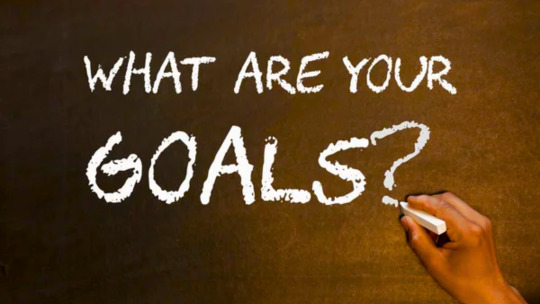
What is the goal you want to achieve with your advertisement? Clearly defining your objective is vital for successful ad creation, including keyword-based ad campaigns. Your goal might fall into one of the following categories:
Brand Awareness: Let people know about your product, service, or content.
Lead Generation: Capture contact information from potential customers.
Step 3: Choose the Right Ad Format
Different platforms have different ad formats that may work better depending on your goal. Here are a few popular platforms and the ad formats you can use:
Facebook & Instagram Ads: These platforms allow a variety of ad types, including image ads, carousel ads (multiple images or videos), video ads, and story ads. They’re great for visual content and social engagement.
Step 4: Craft a Compelling Message
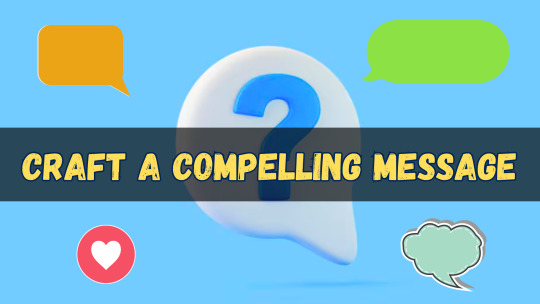
The content of your ad—its copy and visuals—plays a significant role in its success. Here are some suggestions for creating impactful ad copy:
Keep It Simple: People have limited attention spans, so make sure your ad is concise and to the point. Focus on delivering a message quickly and clearly.
Highlight the Benefits: Explain how your product or service solves a problem or meets a need. Use language that appeals to your audience's desires or pain points.
Step 5: Design Your Visual Elements
A visually appealing ad will draw attention and increase the likelihood that users will click or engage. Consider these design tips:
Keep It Simple:Avoid cluttering your ad with excessive text or images. Instead, concentrate on delivering a single, clear message or offer.
Brand Consistency: Use your brand’s colors, logo, and fonts to maintain consistency across all your ads.
Step 6: Optimize Your Ad for Performance

Once your ad is live, it’s important to track its performance and make necessary adjustments. Important metrics to track include:
Click-through Rate (CTR):The proportion of individuals who clicked on your ad after viewing it. A higher CTR signifies that the ad is performing well.
Conversion Rate: The percentage of users who took the desired action (e.g., made a purchase, signed up) after clicking your ad.
Step 7: Test and Iterate
Ongoing testing and optimization are essential for achieving success in ad creation. A/B testing (comparing two versions of an ad) can help you determine what resonates best with your audience. Test different elements like:
Headlines
Call-to-Action
Images and Video Thumbnails
You can also watch: Effortless & Smart Ad Creation Made Simple with AdsGPT!
youtube
Conclusion
Ad creation doesn’t have to be a complicated process. By following these simple steps—understanding your audience, setting clear objectives, selecting the right platform and format, crafting compelling ad copy, and optimizing based on performance—you can do ad creation that effectively engage your audience and meet your marketing goals. Remember, successful ads are the result of constant testing and refinement, so don’t be afraid to experiment and learn as you go.
2 notes
·
View notes
Text
An ‘Ism’ Overview - Performance Art vs. Dadaism
Performance art and Dadaism are two movements in art history that have a lot in common, yet also have significant differences. Both emerged in the early 20th century as reactions against the traditions of the past and the established art world, and both sought to challenge and subvert dominant cultural norms. In this essay, we will explore the similarities and differences between these two movements, and examine how they have influenced the development of contemporary art.
Dadaism emerged in Zurich during World War I, as a response to the disillusionment and despair felt by many artists and intellectuals in Europe at the time. The movement was characterized by a rejection of traditional artistic forms and values, and an embrace of irrationality, absurdity, and anti-art. Dadaists often used chance and randomness in their works, and rejected the notion that art should have any kind of aesthetic or moral value. Instead, they sought to provoke and shock their audiences, and to challenge the very notion of what art could be.
Performance art, on the other hand, emerged in the 1960s and 1970s, as a reaction against the commodification of art and the perceived artificiality of traditional artistic forms. Performance artists often used their own bodies as the primary medium of their works, and focused on the process of creation and the relationship between the artist and the audience. Like the Dadaists, performance artists sought to challenge established cultural norms and to provoke their audiences, but they did so in a more direct and visceral way.
One of the key similarities between Dadaism and performance art is their rejection of traditional artistic forms and values. Both movements sought to challenge the notion of what art could be, and to push beyond the boundaries of established cultural norms. They also shared a desire to provoke and shock their audiences, and to challenge their assumptions about the world.
However, there are also significant differences between these two movements. One of the key differences is the role of the artist in the creation of the work. In Dadaism, the artist often used chance and randomness to create their works, and the final product was often a product of multiple artists working together. In performance art, however, the artist is typically the sole creator and performer of the work, and the focus is on the process of creation rather than the final product.
Another difference between these two movements is their relationship to the audience. Dadaism was often characterized by a sense of alienation and detachment from the audience, with the Dadaists using their works to mock and ridicule traditional values and institutions. In performance art, however, the relationship between the artist and the audience is often more direct and intimate, with the artist using their body and voice to engage with the audience and to create a sense of shared experience.
In conclusion, while there are many similarities between performance art and Dadaism, there are also significant differences that set them apart. Both movements sought to challenge established cultural norms and to push beyond the boundaries of traditional artistic forms, but they did so in different ways and with different goals. Ultimately, both movements have had a profound influence on the development of contemporary art, and continue to inspire artists to challenge and subvert established norms and values.
3 notes
·
View notes
Text
Blog Post #5 (Due 10/3)
How does the merit system in “Nosedive” parallel our perception of social media following?
In the “Nosedive” episode of Black Mirror, each person ranked everyone they interacted with, and one’s overall ranking determined how they were perceived and interacted with by others. This immediately reminded me of how social media status dictates our interpretations of one another. As few people would admit it, I know of many people who when looking at someone’s Instagram account for the first time, make judgments about them based on how many followers they have. Furthermore, when it comes to influencers, many companies only want to collaborate with those who have a certain amount of followers, leaving smaller social media creators to work extra hard to build their platforms. In “Nosedive,” each character’s rating offered benefits to those with particularly high ratings, such as reduced rent, access to certain buildings, and better overall social standing. This is an eerie, but realistic, example of how we let social media standing guide our interactions with people in the real world.
Why is language especially important when discussing social problems and feminism?
The language we use when discussing social issues is very important because it can make the difference in acknowledging or dismissing nuance in these issues. As we read two weeks ago, intersectionality is vital when discussing feminism to ensure that “women’s rights” include all women. As discussed in The Revenge of the Yellowfaced Cyborg Terminator, the authors argue that Haraway’s position as an established, respected white feminist grants her the privilege of an audience: people want to listen to her. However, if a woman of color made the same arguments, she’d likely have a much more difficult time gaining that same audience. When discussing social issues like sexism, it’s important to think critically about the language we’re using and how it may be interpreted to build stronger, more nuanced arguments.
How is voice-based racism more prevalent now than ever?
In her TedTalk, Dr. Lisa Nakamura explains voice-based racism in reference to the judgments we make about someone’s race based on their voice. She argues that with the rise of video games with live audio features (where you can play with friends and strangers), there’s also a rise in voice-based racism online. When we believe we know someone’s race simply from their voice, we open the door for stereotypes and prejudice to guide our interactions with that person. Furthermore, everyone is prejudiced, and these prejudices continue to exist online. I believe making judgments on someone’s voice online is relatively similar to making judgments about their appearance in real life, so voice-based racism is especially important to analyze and acknowledge when we are guilty of it.
What is ludo-Orientalism and how does it work?
→ In The Race card: From gaming technologies to model minorities, the author defines ludo-Orientalism as the way that the “design, marketing, and rhetoric of games shape how Asians as well as East-West relations are imagined,” as well as how Asian people are constantly depicted as “other.” It also refers to the way social constructions of race are perpetuated through games and disguised as “play.” This can be particularly harmful because when something is deemed fun, we assume it to be lighthearted, and we often even assume it to lack any real, societal effect. However, the portrayals of racial groups through video games are often disguised versions of stereotypes, that then get perpetuated for the sake of “a fun game.”
Fickle, T. (2019). The race card: From gaming technologies to model minorities. New York University Press.
Richter, M. (2016). Black Mirror: Nosedive. episode.
Nakamura, L. (2011). TedXUIllinois - Dr. Lisa Nakamura - 5 Types of Online Racism and Why You Should Care. YouTube. https://www.youtube.com/watch?v=DT-G0FlOo7g
Ow, Jeffrey A. “The Revenge of the Yellowfaced Cyborg Terminator: The Rape of Digital Geishas and the Colonization of Cyber-Coolies in 3D Realms’ Shadow Warrior.” Asian America.Net: Ethnicity, Nationalism, and Cyberspace.
4 notes
·
View notes
Text
Hello everyone! A few days ago, I wrote an essay on Accidental Autistic representation in media using the character Diane Nguyen from BoJack Horseman as an example of that as a part of a bigger college paper I'm writing about autistic representation in media! I decided recently that I wanted to make my current essay public as I work on the bigger paper, just as a bit of a taste tester for those interested in what I have to say as well as a way to showcase why I believe Diane Nguyen is autistic coded (as an autistic person)! To those interested, the essay will be put right under the cut! I hope you enjoy it! To those who aren’t, I understand! I hope you have a wonderful day as well!
When trying to come up with ways to make characters with diverse personalities, creators will often end up representing groups of people without initial and deliberate intent. While it may be a bit misleading to call something that was unintentional “representation,” media, in general, is a subjective art form, so it’s important to recognize the merits of what an audience can take from a piece of media, even if it was unintended by its creators. A rather notable occurrence of this would be the abundance of media portraying autistic characters. Accidental Autism in media is often presented as characters who were intended to come off as “quirky” and/or “different” by their creators without realizing the “quirky” traits in question are diagnosable qualities of autism. As a result of this phenomenon, these characters and their reflective arcs often have more focus on who they are overall rather than solely existing to be an “autistic character,” which ends up humanizing and more accurately portraying autistic people and how they function in society. A good example of this happening in a modern-day show would be the accidental representation of autism in BoJack Horseman with the character Diane Nguyen, a frequently recurring character who is one of BoJack's closest friends.
BoJack Horseman is an animated series that debuted on Netflix in August 2014. It stars the titular BoJack Horseman, a washed-up celebrity horse from a popular sitcom from the 90s, and his eccentric friends Princess Carolyn, Mr. Peanutbutter, Todd Chavez, and Diane Nguyen as they all go through the motions of day-to-day life while dealing with heavy topics such as childhood trauma, drug abuse, mental health, abortion, overwhelming fame, etc. Such portrayal of real-life experiences has won the show numerous accolades as well as high critic and audience ratings on Rotten Tomatoes and other similar websites. The show’s writing has managed to touch the lives of a lot of people, and the characters within it are still often discussed to this day as their relatability has withstood the test of time and maintained their relevance in popular culture, even though the series has ended.
A lot of the characters in the show have their respective fans and portray unique viewpoints on life that many can relate to; however, the case of Diane Nguyen (BoJack’s former ghostwriter-turned-friend) in particular, is an interesting one. Of the main characters, she's the only one that people seem to be perplexed by, being labeled as weird or odd, because on a surface level of examination, she may not trigger a general audience's perception of what an autistic woman is. Thus, these traits are unfortunately often perceived as annoying or inconvenient when it comes to furthering the narrative of this show. It is not until all of her acclaimed “annoying” traits are added up that a general audience will recognize how she ends up properly representing the autistic experience.
As outlined by the CDC, certain diagnostic criteria need to be met for an individual to be considered autistic. In particular, there is a minimum of no less than 5 traits an individual must possess that are deemed as being persistent and cause significant impairment in multiple areas of functioning. One of the foremost traits of autism Diane possesses is that of info-dumping, a practice in which someone regurgitates as much information about a specific topic as they possibly know onto someone else in an unprompted manner at random parts of conversations throughout the run of the show. In season 1, episode 3 “Prickly-Muffin,” Diane goes on a tangent about her thoughts on Sarah Lynn, tying into her feminist views in general without understanding fundamentally that BoJack wasn’t meaning to ask for her actual opinion of Sarah Lynn; he was more trying to get Diane’s opinion of her being in his house (Bob-Waksberg). Another instance of this occurring would be in Season 3, Episode 7 “Stop the Presses.” This time, Diane goes on a tangent about her disastrous trip to work, which led her to be nearly 2 hours late. This event proceeds from a comment Princess Carolyn had made where the latter replies, “I’m hanging onto every word” (Bob-Waksberg). She says this in a sarcastic tone, which is implied to have flown over Diane’s head, as she responded to her literally. While these instances may seem innocuous at first glance, “deficits in social-emotional reciprocity…from abnormal social approach and failure of normal back-and-forth conversation” as outlined above is a rather important trait of autism (CDC). While this is still a noticeable way to indicate autism to an audience, the usage of how her traits are portrayed is visible enough to cause some people to consider it while not overriding who the character is fundamentally.
Diane’s link with the traits of autism spectrum disorder (ASD) doesn’t end there. She often misreads social situations and ends up spouting inappropriate conversation as a result of not understanding nonverbal behaviors. She exaggerates her facial reactions in situations that don’t necessarily warrant said expression, such as times when she’ll widen her eyes for no reason mid-conversation. While it's not expressly stated in the show whether or not it is something she does purposely, the intention of showcasing this behavior, in particular, could go either way. Either she's doing it as a result of years of masking, a process in which an autistic person attempts to conform to societal norms, or she’s just the type to make random faces from time to time. She also tends to have the opposite problem where her delivery of important information comes off as dry as a result of her lack of intonation and expression in her delivery. A good example of this would be how she responded to her co-worker (at the time), Guy, in the episode “Feel-Good Story.” He invites her over to his place to watch a game, and her tone while accepting the invitation is monotonous, even though you can tell she’s genuine in her delight (Bob-Waksberg). Diane’s also very prone to viewing situations logically by default, which often leads to negative reactions by others, best showcased by the time she alluded to the harassment she experienced as a result of some popular cheerleaders in high school who wrote “virgin slut” on her forehead. Her initial reaction to their harassment was to question how she could “be both a virgin and a slut at the same time", disregarding the elephant in the room of the fact that she was being harassed at all (Bob-Waksberg). She’s missing the social situation of what’s occurring then entirely, focusing more on the logical fallacy of the cheerleader’s statement rather than the fact that they were harassing her. Another example of this behavior occurring in the show would be when she first met Sonny and he talked about how his parents would get back together, as they’re secretly still in love after their divorce, whereas Diane’s initial reaction was to tell him that it wasn’t true because “[his parents] hated each other and fought all the time” (Bob-Waksberg). These traits would all constitute what the CDC labels “deficits in nonverbal communicative behaviors used for social interaction,” but are done in a way where they don’t feel like a caricature. As a result of her tendency to read situations and respond literally, it feels as though it comes more naturally to the character, rather than feeling as if there are very specific beats that she needs to hit for the writers to feel as though they’ve accomplished autistic representation.
Diane furthermore largely dislikes social events as they make her uncomfortable because she often fundamentally doesn’t understand what to do and how they’re supposed to work. In that manner, Diane admits: “When you’re Diane, you can live your whole life like it’s a puzzle, put together from the pieces of different sets…your whole life is full of these pieces that don’t quite fit. But at some point, you start to think it’s you. You’re the piece that doesn’t quite fit” (Bob-Waksberg). This behavior of hers would constitute “Deficits in developing, maintaining, and understanding relationships, ranging, for example… difficulties adjusting behavior to suit various social contexts,” according to the CDC. Shown struggling to understand how people around her go about partying and/or socializing in general, it makes her feel like an outcast due to her innate differences. Moreover, her over analyzation of people and what they’re doing in certain situations to decode and then imitate such behaviors is a great example of when she described how she would simply observe and study how people interacted together at parties in the first episodes of the show (also directly linking to how she mimics her friend's unique behaviors unconsciously). Such as when she copied one of BoJack’s quirks in which he asserts his full identity over phone calls; “This is Diane by the way… Nguyen, obviously” (Bob-Waksberg). This further supports her tendency to try to adjust to her environment.
Whether she’s adjusting her glasses an unnecessary amount of times or she’s pushing her hair back over and over again, Diane tends to fidget around in a manner that would be seen as excessive and distracting from an outside perspective. She always seems a bit uncomfortable with conversations, especially when said conversations involve her communicating en masse with people, so as she’s interacting with others to calm herself, she’ll repeat certain motions. This falls under the diagnostic category of stereotyped/repetitive motor movements, repeating these actions as a form of soothing herself in uncomfortable situations一 also known as stimming.
“Highly restricted, fixated interests that are abnormal in intensity or focus” are a rather well-known autistic trait, and something that Diane exhibits in a wonderfully noticeable yet subtle way (CDC). She tends to develop obsessive interests in random things that can go unnoticed in the grand scheme of the show if not focused on, such as when she fixated on making the perfect grilled cheese when she first moved to LA, making them for every meal she ate at that point in her life until she had felt she perfected the recipe (Bob-Waksberg). This demonstrates how intensely focused she can become on a topic, and how willing she is to see the ideas she has through. Another would be her strong desire to help people and her fixation on change and fixing things, even when it comes to her detriment, such as when she took a very public stance against a celebrity in the show who’d been accused of sexual assault and continued to hold her ground even when she received several threats to her life for refusing to drop the allegations she made against him in the season 2 episode “Hank After Dark” (Bob-Waksberg).
While it’s clear that characters like Diane are autistic to an audience who are looking for these traits, they often fly over the heads of those who aren’t intending to view said characters as autistic, including creators. In trying to come up with a character that they deem as different from what would be considered socially acceptable, the media will often take inspiration from autistic traits, which creates a rather interesting result of good autistic representation. Unintentionally, the accidental combination of traits resulting in an accurate depiction of autism, such as those seen in Diane Nguyen, creates a clear dichotomy between characters with qualities forced into checking the boxes of CDC guidelines. These content creators, along with the characters born from simply recognizing autistic traits as common in society and innately human, deliver an accurate, relatable, and profound representation of a subgroup that is often dramatized and embellished in a manner that becomes inaccurate in modern media.
My Works Cited
“Diagnostic Criteria.” Centers for Disease Control and Prevention, Centers for Disease Control and Prevention, 2 Nov. 2022, https://www.cdc.gov/ncbddd/autism/hcp-dsm.html.
Bob-Waksberg, Raphael, writer/creator. "Prickly-Muffin" BoJack Horseman, season 1, episode 3, The Tornante Company / Boxer vs. Raptor / ShadowMachine, 22 August 2014. Netflix, https://www.netflix.com/watch/70298932?trackId=14170289&tctx=2%2C0%2Ccd3cc07a-d98d-468c-8bc4-dfcb3ded2d58-331248819%2CNES_BB936C03657FFA88767C5DAF178961-B9F225DDE3A711-3DF1649C24_p_1678406684315%2C%2C%2C%2C%2C70300800%2CVideo%3A70300800
Bob-Waksberg, Raphael, writer/creator. "Stop the Presses" BoJack Horseman, season 3, episode 7, The Tornante Company / Boxer vs. Raptor / ShadowMachine, 22 July 2016. Netflix, https://www.netflix.com/watch/80073223?trackId=14170289&tctx=2%2C0%2Ccd3cc07a-d98d-468c-8bc4-dfcb3ded2d58-331248819%2CNES_BB936C03657FFA88767C5DAF178961-B9F225DDE3A711-3DF1649C24_p_1678406684315%2C%2C%2C%2C%2C70300800%2CVideo%3A70300800
Bob-Waksberg, Raphael, writer/creator. "Feel-Good Story" BoJack Horseman, season 6, episode 3, The Tornante Company / Boxer vs. Raptor / ShadowMachine, 31 January 2020. Netflix, https://www.netflix.com/watch/81026961?trackId=14170289&tctx=1%2C0%2C9a11e1d5-7da2-450e-8743-fc53e5b0bcb0-47084340%2CNES_BB936C03657FFA88767C5DAF178961-B9F225DDE3A711-AE978428A7_p_1678524571926%2C%2C%2C%2C%2C70300800%2CVideo%3A70300800
Bob-Waksberg, Raphael, writer/creator. "One Trick Pony" BoJack Horseman, season 1, episode 10, The Tornante Company / Boxer vs. Raptor / ShadowMachine, 22 August 2014. Netflix,https://www.netflix.com/watch/70298939?trackId=14170289&tctx=2%2C0%2Ccd3cc07a-d98d-468c-8bc4-dfcb3ded2d58-331248819%2CNES_BB936C03657FFA88767C5DAF178961-B9F225DDE3A711-3DF1649C24_p_1678406684315%2C%2C%2C%2C%2C70300800%2CVideo%3A70300800
Bob-Waksberg, Raphael, writer/creator. "Xerox of a Xerox" BoJack Horseman, season 6, episode 12, The Tornante Company / Boxer vs. Raptor / ShadowMachine, 31 January 2020. Netflix,https://www.netflix.com/watch/81026970?trackId=14170289&tctx=2%2C0%2Ccd3cc07a-d98d-468c-8bc4-dfcb3ded2d58-331248819%2CNES_BB936C03657FFA88767C5DAF178961-B9F225DDE3A711-3DF1649C24_p_1678406684315%2C%2C%2C%2C%2C70300800%2CVideo%3A70300800
Bob-Waksberg, Raphael, writer/creator. "Angela" BoJack Horseman, season 6, episode 14, The Tornante Company / Boxer vs. Raptor / ShadowMachine, 31 January 2020. Netflix,https://www.netflix.com/watch/81043629?trackId=14170289&tctx=2%2C0%2Ccd3cc07a-d98d-468c-8bc4-dfcb3ded2d58-331248819%2CNES_BB936C03657FFA88767C5DAF178961-B9F225DDE3A711-3DF1649C24_p_1678406684315%2C%2C%2C%2C%2C70300800%2CVideo%3A70300800
Bob-Waksberg, Raphael, writer/creator. "See Mr. Peanutbutter Run" BoJack Horseman, season 4, episode 1, The Tornante Company / Boxer vs. Raptor / ShadowMachine, 8 September 2017. Netflix, https://www.netflix.com/watch/80117548?trackId=14170289&tctx=2%2C0%2Ccd3cc07a-d98d-468c-8bc4-dfcb3ded2d58-331248819%2CNES_BB936C03657FFA88767C5DAF178961-B9F225DDE3A711-3DF1649C24_p_1678406684315%2C%2C%2C%2C%2C70300800%2CVideo%3A70300800
Bob-Waksberg, Raphael, writer/creator. "Hank After Dark" BoJack Horseman, season 2, episode 7, The Tornante Company / Boxer vs. Raptor / ShadowMachine, 17 July 2015. Netflix, https://www.netflix.com/watch/80048082?trackId=14170289&tctx=1%2C0%2C9a11e1d5-7da2-450e-8743-fc53e5b0bcb0-47084340%2CNES_BB936C03657FFA88767C5DAF178961-B9F225DDE3A711-AE978428A7_p_1678524571926%2CNES_BB936C03657FFA88767C5DAF178961_p_1678524571926%2C%2C%2C%2C70300800%2CVideo%3A70300800
24 notes
·
View notes
Text
Unit 04: Nature Interpretation through Art
This week's prompt posed a daunting first question about the authority to interpret nature through art.
Reflecting on the readings, I learned that interpretation through art comes in various forms, whether it's visual art, music, dance, magic, photography, theatre, or storytelling. These diverse mediums possess the ability to "transform our limited vision" (Rosemary Gladstar), conveying both information and accompanying emotions (Beck et al., 2018). Notably, the perception of a medium, like nature interpretation, is unique to the individual.
Everyone has the freedom to interpret nature through art based on their own perceptions. The freedom of art allows individuals to express their feelings across various mediums. The flexibility in this freedom is what makes art unique and powerful! Each medium appeals to different individuals in distinct ways, resonating with them emotionally or spiritually, similar to how nature can be interpreted and communicated, as we have learned during this course.
During the pandemic, I had the opportunity to attend the Immersive Van Gogh Exhibit in Toronto, which I recall left a lasting impression. Although not all of Van Gogh's work illustrates landscapes and natural elements, the chosen medium (projections accompanied by music) appealed to me visually and provided a distinct interpretation of Van Gogh's art. Applying this to this week's prompt, I now ponder the same question. Perhaps unknowingly or without intent, who was Massimilian Siccardi to interpret nature through art (Immersive Van Gogh NYC, 2021)? My stance remains unchanged – no one can dictate how nature should be presented through a specific medium. If the creator finds freedom and appreciation in its creation, resonating emotionally or spiritually, it will likely provoke an audience. Given my experience, I believe nature interpretation through art has continued throughout history because it interprets our culture and landscape (Beck et al., 2018).

Turning to "the gift of beauty," although cliché I believe beauty is in the eye of the beholder, aligning with Aldo Leopold's sentiment that "our ability to perceive quality in nature begins, as in art, with the pretty" (Beck et al., 2018). For me, if something is aesthetically pleasing, it holds a form of beauty. This aligns with the textbook's brief reference to "sense the beauty in their surroundings." Ultimately, I think anything evoking a sense of place, as described in the textbook, or evoking a "Wow!" is a worthy element of beauty. This is why incorporating diverse mediums becomes crucial in creating an inclusive space where everyone can appreciate the beauty of nature in their unique ways.
Interpretation is a personal experience in which "the arrangement of colours and forms, vibrant images resonate in the viewer's mind in ways that celebrate the world we live in" (Beck et al., 2018).
References:
Beck, L., Cable, T. T., and Knudson, D. M. (2018). Interpreting cultural and natural heritage: For A Better World. Sagamore Publishing.
About the original immersive Van Gogh exhibit New York City. Immersive Van Gogh NYC. (2021). https://vangoghnyc.com/about/#:~:text=Immersive%20Van%20Gogh%20was%20created,2%20million%20visitors%20in%20Paris
2 notes
·
View notes
Note
Hello hello my love, may I please ask about 21, 73 and 76? x
Hello my beloved 💕 I'm so sorry for the late response. I've started answering you multiple times but irl things kept getting in the way and I took a small break from here! Really, I just wanted to give you a serious answer that I took my time with instead of something rushed and not very well thought out. I hope you can forgive me darling.
21 - Do you prefer writing chaptered fics or one-shots?
I don't have very many chaptered fics but as I've been growing and evolving in my writing style I think I've begun to gravitate towords chaptered fics. I find a lot of joy in developing plotlines and characters through multiple chapters. It's an interesting and fun challenge to face, but one-shots will always hold a special place in my heart.
73 - What do you tend to get complimented on the most about your writing?
Hmm, this was interesting to disect but I think I get complemented on my aestetics the most lol.
76 - How do you deal with writing pressure, whether internal or external?
Fyi, I've written the response to this question like five different times now. I think I've settled on an okay respose, but I wanted to take the time to get this right. I know so many fic writers and creators deal with stress, and not all of us come out the other side as creators still. While I'm unsure if my insights will be helpful to you, I hope you can find something valuable in my perspective.
(Full answer under the cut bc it's long.)
We've previously discussed the unique frustrations that fic writers face, particularly on this website. The constant barrage of anonymous asks, only inquiring about more content or the release date of the next chapter, the likes without comments or reblogs, and the limited interactions can wear you down over time. I know that I've felt the weight of these pressures and so have so many countless others. There are numerous other aspects I could complain about, but I am actively working on letting go and trying to move past these things.
It can be difficult when, at one point, fic writing felt like an avenue to engage in commentary, discussions, and the social aspects of the community, rather than merely producing content for others to enjoy. The stress and perceived pressure to consistently create began to erode my love for writing, prompting me to step away. I needed to distance myself from everything, and surprisingly, it turned out to be a positive decision. During my break, I created a side blog using a completely different email address, allowing me to enjoy things without feeling the need to hold myself to any standards or obligations. I granted myself permission to consume instead of constantly create, and to enjoy without worry. Taking that break was a significant step for me, enabling me to establish boundaries, which was exactly what I needed. I realized I had been giving too much, rushing through writing instead of savoring the process.
Now, with a story that I hold dear to my heart, I find myself in a place where I can dedicate myself to it and genuinely enjoy the journey. I am completing the story for myself because I genuinely want to, without the burden of writing other fics or constantly trying to entertain followers. Even with this mindset, I must admit that I don't have a comprehensive answer for you. After being away for over a year, gaining a fresh perspective on things helped immensely. Additionally, the words of a cherished mutual we share had a profound impact on me. They expressed, in their own way, that my fics are already complete the moment I posted them. Regardless of any future chapters promised. It's perfectly acceptable if I never post an ending because the audience is not entitled to one.
Dealing with writing pressure, whether it stems from internal expectations or external demands, requires a conscious effort to set boundaries and prioritize personal enjoyment and fulfillment. Taking breaks, gaining perspective, and finding solace in the fact that your creations are already complete can all contribute to a healthier and more enjoyable writing experience. Remember, your writing journey should ultimately be driven by your own passion and desire, rather than solely catering to the expectations of others. I know that this is easier said than done. I know. But hopefully you can take a piece of this and apply it to your own stess.
7 notes
·
View notes